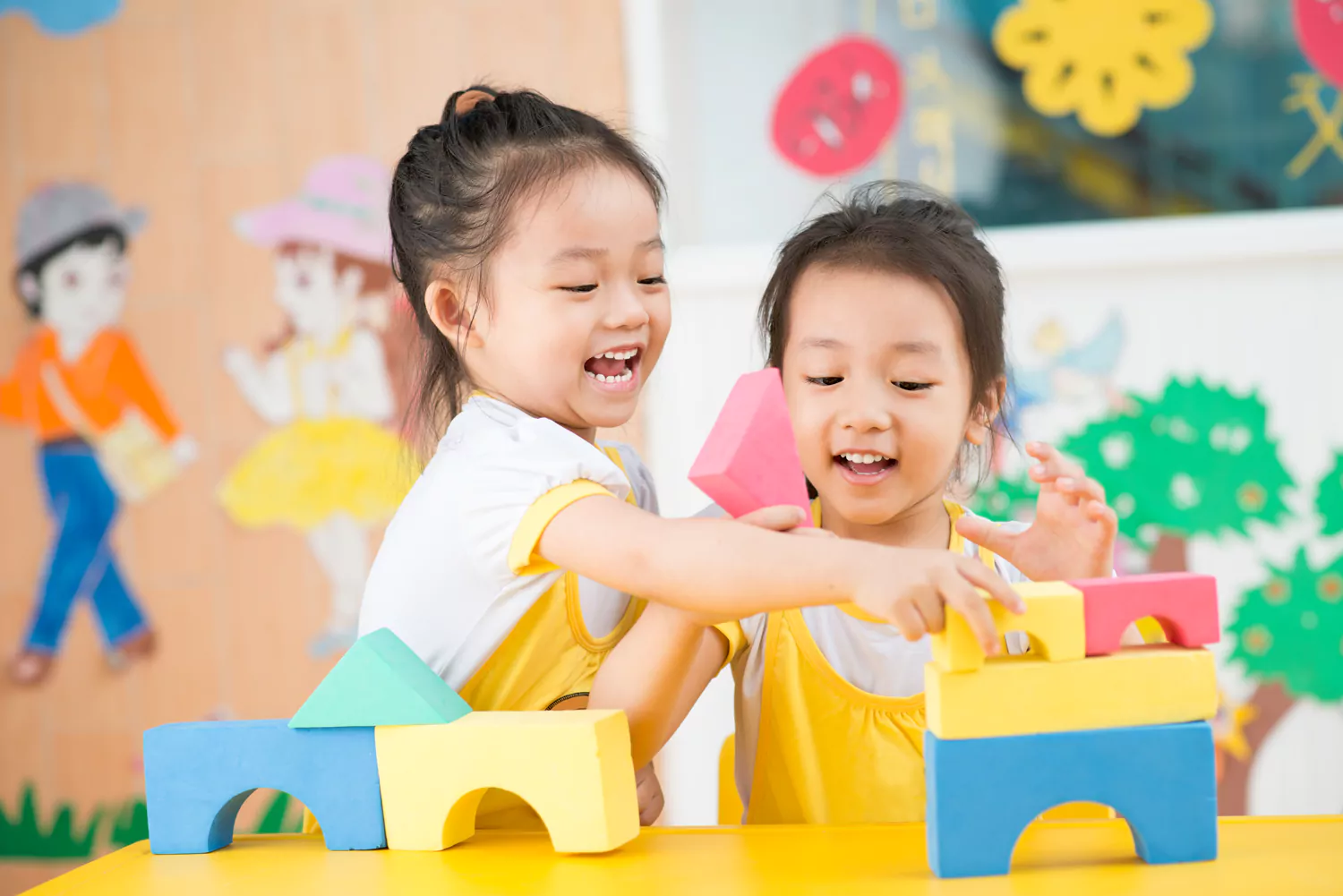Why Is Play Important For Your Child?
“Play is the highest expression of human development in childhood for it alone is the free expression of what is in a child’s soul.”
– Friedrich Froebel
Play-based learning is not only crucial to children’s creativity, it is also fundamental to their growth and well-being. Through play, parents will be able to unify all domains of a child’s development, including cognitive, social-emotional, language, and physical growth.
However, despite its many benefits, statistics show that the amount of time children get to engage in play is on the decline. Tightly structured family schedules, both parents working, fewer safe places for children to play, and high levels of time spent on digital devices are among the primary reasons why play takes a backseat.
We are all guilty of this as we find ourselves deeply engaged with the digital world and relentlessly stare at screens – gaming, texting, and watching favourite movies. This trait often results in a general decline in health and a reduction in physical activities that is necessary for the well-being of young children.
“The right to play is enshrined in the UN Convention and the importance of ensuring children have opportunities and spaces to play where they feel safe and can enjoy themselves”, is seen as a basic necessity.
Every child wants to learn
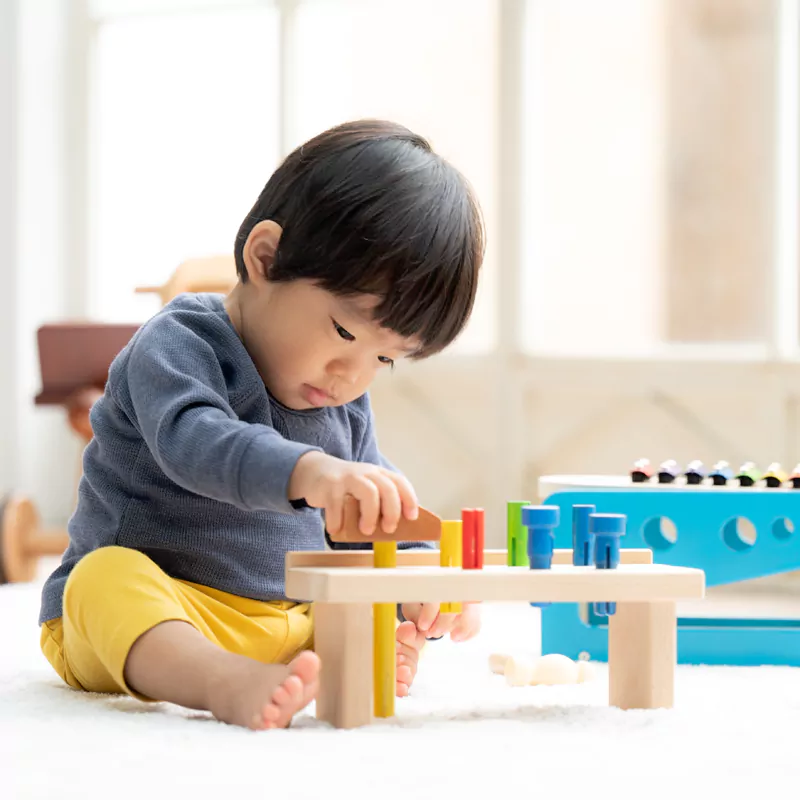
Your child is unique and what she can do rather than what she cannot, is the starting point for her to begin her learning. This is why participating in physical development in early childhood helps your child to learn by doing things independently and becoming more aware of her own learning. This is why each child deserves to be respected for who they really are, as well as feel valued and rewarded for their efforts.
Physical development in early childhood is actually a preparation for the next stage of learning. This is why childhood is an invaluable period where learning can truly begin and several important skills for relationship building can be acquired and nurtured.
Play helps a child to relate to her inner world of feelings, ideas and lived experiences and takes her to higher levels of thinking, feeling, imagining and creating. It is also a resource a child can draw upon in the future. All you really need to do is offer your child the freedom and guidance to enrich her play and put it in a learning context.
Through play and physical development in early childhood, children get to flex their minds and bodies, instead of just whiling away their time noting down rigid facts and figures. Play is also how children discover new ways of thinking, creating, working together and testing ideas. In effect, a child gets to practice skills she would be needing to thrive throughout her life.
So, the sooner parents bring learning through play into their daily routine at home, the sooner they’ll begin to enable their children to get set for a brighter tomorrow. Whatever that tomorrow may hold for them.
The power of play
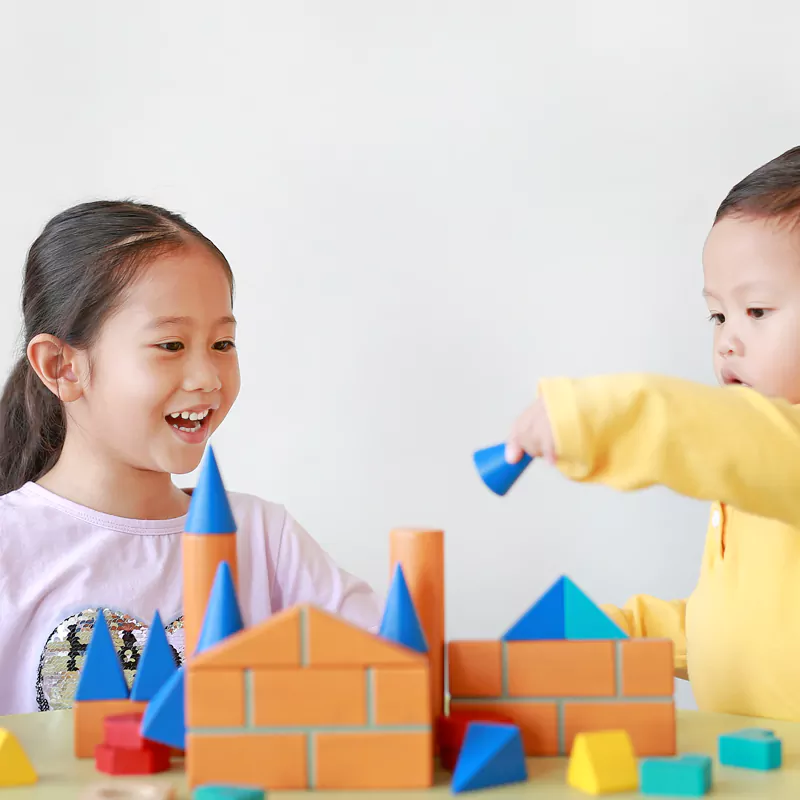
A child comes into the world ready to experiment, and use what she discovers, this not only adapts the structure of her brain but also strengthens the skills she’d require to continue to remain engaged, and become a flexible learner throughout her lifetime.
When children play, they have fun, they experiment, and they don’t worry about getting things wrong. Play gives children a safe space that they need to pick up skills that’ll help them thrive today and as they grow up. This in essence is what the joy of learning actually means.
A child’s brain literally changes as she plays and learns. New neural networks are formed, connect, and grow stronger through active usage. It is in essence, all about learning through discovery.
Play sparks the brain’s reward centres, triggering a feel-good chemical called dopamine. Higher levels of dopamine are linked to aiding better memory and increasing attention spans, creativity, and mental flexibility.
Playful learning is meaningful when it links new experiences – such as watching a horse gallop in an open field – to familiar ones, like the horse in a child’s favourite picture book. Making these connections expands a child’s grasp of the world. And it lights up a number of different areas of the brain: motivation, sense-making, reflection and memory.
Holistic skills for a holistic world
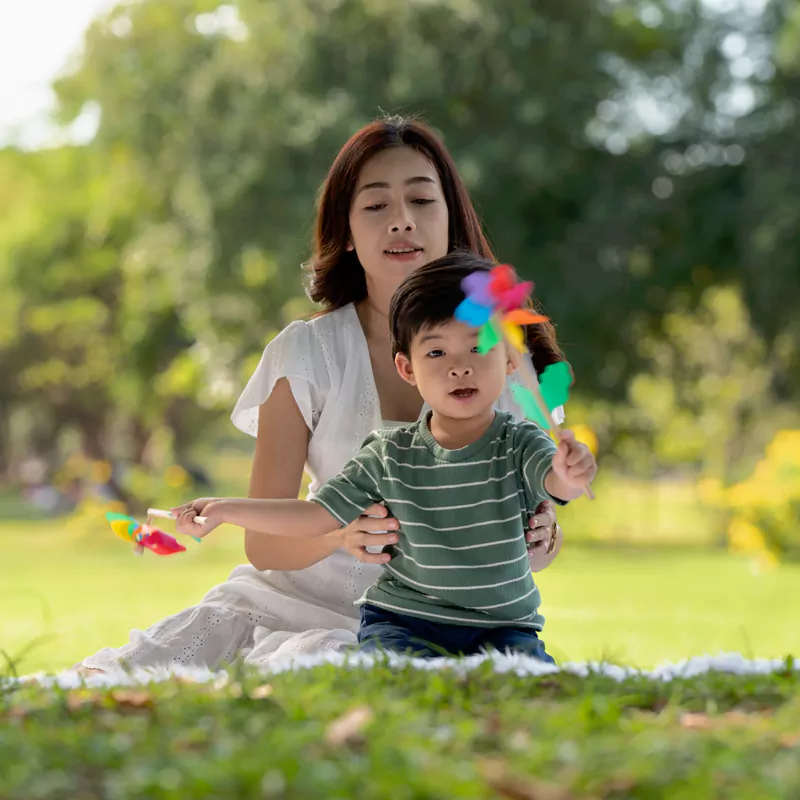
Every day we carry out most physical actions without even thinking as these have become second nature to us. From working out how to get from point A to point B, to doing quick mental maths, to simply chatting with friends, colleagues and loved ones. The fact is we use more than one skill to achieve anything we want to do.
It’s the same when it comes to children. Take, for instance, a toddler learning to walk. As well as the physical strength of using her muscles in a new way, she would need the cognitive skills to coordinate her arms and legs, and acquire depth perception to navigate the path ahead of her.
What is important to note is our world never stops changing, so the best thing to do is to prepare our children to navigate it efficiently. Play-based learning provides the right opportunities to be able to do just that — think, negotiate, adapt to new rules and try again when things don’t go to plan.
Physical skills:
Involving children in play-based learning activities from an early age ensures the growth of the brain and body as a child develops. It helps in a child’s overall development and growth. Children who are involved in physical activities develop better coordination, balance, and strength. They also learn to understand their own bodies and how they move in space. This can also help improve their self-esteem and confidence.
Physical activities and play-based learning also provide an opportunity for children to practice their gross motor skills such as running, jumping, and crawling, as well as fine motor skills such as manipulating small objects and using their fingers and hands with precision.
Play-based learning has a positive impact on a child’s mental health and well-being. Studies have shown that physical activity can reduce stress and anxiety, and improve mood and overall emotional well-being. Children who engage in physical play also have better sleep and are less likely to suffer from obesity and related health problems.
It is important for parents to encourage their child to participate in physical activities and play, both inside and outside of the home. This will help children to develop physically, mentally and emotionally, and lay the foundation for a healthy and active lifestyle in adulthood.
Language skills:
Language is one of the most important skills children learn as they play. When children play with others, they have the opportunity to practice their social skills, including sharing, cooperation, and negotiation, all of which are essential for later success in life.
Play-based learning also provides a safe and supportive environment for children to experiment with language, try out new words, and make mistakes without the fear of being judged or corrected. This is why it is so important for parents to engage with children during play and provide them with a positive and encouraging atmosphere.
Additionally, parents can support their child’s language development by reading to them, singing songs, and engaging in conversation. It’s also important for parents to respond to their child’s communication efforts, even if they are not fully formed sentences, as this reinforces their efforts and helps build their confidence in speaking and expressing their true feelings and thoughts.
Physical development in early childhood is a powerful tool for language learning and a child’s overall development, and it’s never too early to start engaging with your child and supporting their growth.
Cognitive skills:
Play-based learning is a natural and enjoyable way for children to develop their cognitive skills, and it should be encouraged as part of a well-rounded and balanced childhood. When learning is playful, children would want to stretch and push their imagination to its limits.
Play-based learning helps build a child’s cognitive abilities, including problem-solving, critical thinking, and decision-making skills. Additionally, play activities improve memory and concentration by challenging your child’s mind to recall information and stay focused for longer periods of time. Through play, children are able to explore their environment, experiment with new ideas, and practice different skills in a fun and engaging way.
Different types of play have different effects on a child’s cognitive development. For instance, imaginative play, when your child acts out scenarios and creates her own stories, you get to help build her creativity and imagination. Games that require strategies, such as board games or card games, can help to improve problem-solving and decision-making skills.
Since we don’t know what the future holds, flexible thinking is what will help children adapt to whatever new careers and life challenges the grown-up world has to offer them. Playing with your child is important as it also helps build a deeper relationship between you and your child.
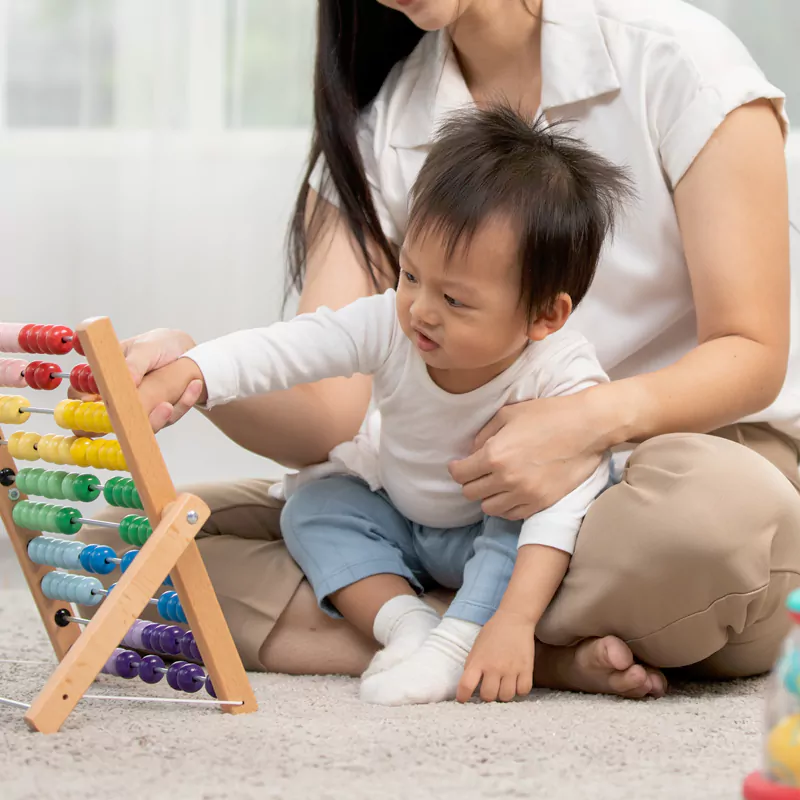
Creative skills
Creativity is a vital aspect of our lives. It’s not just about artistic expression, but also about innovative thinking and problem-solving. Creativity helps us to approach challenges and tasks with a fresh perspective, and enables us to come up with unique solutions.
Developing creativity in your child will allow her to express herself in a manner that is true to who she truly is, and this can have a profound impact on her sense of identity and self-esteem. By engaging in creative activities, your child will be able to tap into her imagination, explore new ideas, and find fulfillment in the process.
In today’s rapidly changing world, the ability to think creatively is becoming increasingly important, as businesses and organizations look for individuals who can bring new and innovative solutions to the table.
Being creative can help your child to stand out, and leverage the world of opportunities, both personally and professionally. So, it’s never too late to start exploring and developing your child’s creative skills. Start right away!
Social skills
The process of interactions and building relationships during early childhood development is how children learn and develop conflict resolution skills, show empathy towards one another and understand how to effectively work together with their peers.
This is the reason why so many games are better when played with friends and siblings.When children play and work together to solve problems, they learn to think through new ideas, listen to others and even negotiate. Play allows children to explore and understand feelings, learn how to express them, and develop self-control.
Playing together helps build empathy by forcing children to think about their teammates. It’s also an essential skill for grown-up life as well. Being able to collaborate helps children improve their own mental health and well-being too.
Emotional skills
Play is a crucial aspect of children’s development, as it provides opportunities for them to learn valuable life skills. When children play, they have the chance to explore and experiment, to work through challenges, and to develop their emotional and social skills. Through play, they learn how to collaborate, compromise, and communicate with others, all of which are important skills that will serve them well as they grow and mature.
More importantly, losing in a game or project can help children build resilience and develop a growth mindset. They learn that setbacks are a natural part of the learning process and that they can overcome obstacles and continue to grow and improve. This experience helps them develop a sense of perseverance and determination, which will be useful to them in many other areas of their lives as well.
In other words, they come to know when their buddies feel happy, annoyed or upset. And, learn how to stay the course together. They also get to learn that play is not just about having fun and enjoying the moment. It’s about developing critical life skills that will help children succeed and thrive in the future.
About My Gym
My Gym involves children in dynamic games, physical activity and movement that help in building neural networks in the brain. Customizing its enrichment programs and workshops makes it easier for children to acquire intellectual skills, navigate complex social situations, and nurture emotional development.
Please visit any of our centres to learn more about how My Gym supports “whole-child development” through bespoke physical activities. Choose a day when you will be relatively free and come over with your child in tow. Your child could be an infant (as young as 6 months), a toddler or a preschooler, age is not a bar for enrolling.
My Gym has perfected the art of physical development in early childhood, helping a child improve her gross and fine motor skills. It has specially designed programs that will lay a firm foundation for personal, academic and future growth by involving your child in age-appropriate structured and unstructured physical activities and developing thinking and problem-solving skills.
Please note: My Gym classrooms are thoroughly sanitized every day — the tables, the chairs, the children’s activity stations and everything else the child might touch is made safe and clean. Please wear a mask, wash your hands frequently, and practice social distancing.
Frequently Asked Questions
How does play impact a child’s brain development and learning?
Play-based learning is crucial for holistic child development and has a positive impact on academic achievement, social skills, and emotional well-being.
Impact of play education on a child’s cognitive development:
– It helps children develop social and emotional skills, such as communication, empathy, and problem-solving.
– Children learn to regulate their emotions, express their creativity, and build relationships with others.
– It promotes brain development by strengthening neural connections, which enhance learning and memory.
Can physical activities and play-based learning improve a child’s self-esteem and confidence?
Yes, encouraging physical development in early childhood through play-based learning is a great way to help improve your child’s self-esteem and confidence. By participating in activities that are fun and enjoyable, children can develop a sense of mastery and joy of learning that can boost their self-confidence. Play-based education also allows children to explore their interests and abilities, which supports their self-awareness and self-esteem. So, if you want to support your child’s overall well-being and development, try incorporating physical activities and play-based enrichment into their daily routine.
What is flexible thinking and how does it benefit a child’s cognitive development?
Flexible thinking is the ability to approach a problem or situation from different perspectives and come up with unique solutions.
For instance, consider a simple game of building blocks. Your child may start by following a set of instructions to build a specific structure, but as they progress, they may start to experiment with different shapes, colors, and sizes. Through this process, they are learning to think creatively and problem-solve on their own, developing important cognitive skills that will benefit them in all areas of life.
To encourage your child’s creative thinking in play, try to engage them in at least one play-based learning activity each day. This could be something as simple as playing a game that involves problem-solving or trying a new art project where they can express their creativity.
What are some ways to encourage creative thinking in children during play?
By recognizing the importance of play in child development and promoting creative thinking during play, we can help children grow into healthy, well-rounded individuals. Here are a few ways to encourage creative thinking in play:
1. Provide open-ended materials for play, such as blocks, art supplies, and dress-up clothes. This allows children to use their imaginations and come up with their own ideas.
2. Avoid micromanaging play and let children take the lead. This allows them to develop their problem-solving and decision-making skills.
3. Encourage experimentation and taking risks during play. This can help children learn from their mistakes and develop resilience.
4. Allow time for unstructured play, without specific goals or objectives. This gives children the freedom to explore and create on their own.
What are some emotional skills that children can learn through play?
Through play-based learning, children tend to develop a range of emotions such as empathy, self-awareness, self-regulation, and communication. For example, when children engage in imaginative play, they learn to take on different roles and perspectives, which can help them develop empathy and an understanding of others’ feelings. Pretend play also enhances emotional skills in children as they learn to express and regulate their own emotions while acting out different scenarios and exploring different responses to different situations. Playing with others can help children develop communication and social skills, such as turn-taking, sharing, and resolving conflicts.



